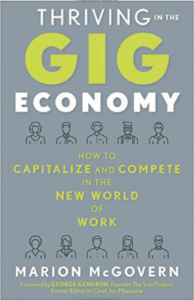The gig economy can be unlocked with the proper tools, discovers Luisa Cheshire
I’d seen the weather forecast – so I worked ten-hour days all Saturday and Sunday when it was raining, so I could sunbathe the following Thursday and Friday in the coming heatwave,” one freelance colleague told me, explaining why she refused to take a staff job despite several offers for her signature. “I can’t see an employer ever being able to grant that level of flexibility.”
The gig economy is by turns exciting, liberating and terrifying, depending on your point of view – and your mood. Gigging can be a pleasant existence if you are good at it: you need a well-paying, reliable client base; exemplary standards of self-organization; and – to make the most of it – a willingness to enjoy the quieter periods while being able to secure future income. Many of the great freelancers I work with admit that they struggle most profoundly with the latter part. Because all their ‘holidays’ are unpaid, the tendency is to fret about them to the extent they don’t enjoy them, or don’t take them at all.
Marion McGovern is here to help. Her invaluable handbook offers superior insight for those working as, or looking to become, gig workers. She covers the crucial tools needed to harness this booming sector (44 million workers in the US alone, and counting); includes key insights into how to make the most of the proliferation of gig platforms to make your entry into the sector easier and more fruitful; and offers valuable lessons in the minutiae of American employment legislation, personal branding and striking contracts.
Yet this is not just a book for suppliers – it is required reading for companies that need to learn how to make themselves attractive to ultra-flexible freelance talent.
Since chiefly office-based Baby Boomers began to dwindle in workplaces, the race towards a fully footloose world has quickened. Generation X introduced remote working. Millennials have been thrown into a global workplace where, as the great business philosopher Charles Handy says, those with a “proper job” inside a company are already in the minority.
Thriving in the Gig Economy is a practical passport rather than a piece of futurism. But it made me wonder whether the nine-to-five is itself a sunset industry, and sweating on a Saturday to permit sunbathing on a Thursday might very soon put it into total eclipse.
— Thriving In The Gig Economy
Marion McGovern (New Page Books)
bit.ly/gigeconomybook
— Luisa Cheshire is chief subeditor of Dialogue


